- Home
- Tobias Wolff
The Night in Question: Stories
The Night in Question: Stories Read online
ACCLAIM FOR TOBIAS WOLFF
The Night in Question
“Simply lovely.… [Wolff’s] plots burn with the passion of a storyteller obsessed with what he knows.… Tobias Wolff has the heart of a writer, and that is no small treasure.”
—Boston Globe
“Wolff is among the most gifted of today’s writers.… [His] work is beautiful and wise … both subtle and passionate.”
—Times Literary Supplement (London)
“Puts us in the hands of a master craftsman.… Intricate and highly compressed, Tobias Wolff’s explorations of our emotional and moral infrastructures are psychological travelogues.… [He] shows us ourselves in all our graceless glory.”
—A. M. Homes, Bomb
“With a hand light and deft enough for neurosurgery, he takes a common experience … and carves from it powerful drama and elemental emotion.… [These are] magnificent stories.”
—San Francisco Chronicle
“Perhaps the most enjoyable American short story writer working today.”
—Cleveland Plain Dealer
“The best of [these fictions] are certainly among the most accomplished being written in our time.”
—Kirkus Reviews
ALSO BY TOBIAS WOLFF
In Pharaoh’s Army
This Boy’s Life
Back in the World
The Barracks Thief
In the Garden of the North American Martyrs
TOBIAS WOLFF
The Night in Question
Tobias Wolff’s memoir of Vietnam, In Pharaoh’s Army, was a finalist for the National Book Award, and his childhood memoir, This Boy’s Life, won the Los Angeles Times Book Award in 1989. His other books include two story collections, In the Garden of North American Martyrs and Back in the World, and The Barracks Thief, a short novel for which he received the PEN/Faulkner Award. He has also won the Rea Award for excellence in the short story. He lives with his family in upstate New York, where he is writer-in-residence at Syracuse University. The stories in The Night in Question—three of which were selected for the Best American series—have appeared in periodicals ranging from Antaeus to The New Yorker, Story to Granta, TriQuarterly to Esquire.
FIRST VINTAGE CONTEMPORARIES EDITION, OCTOBER 1997
Copyright © 1996 by Tobias Wolff
All rights reserved under International and Pan-American Copyright Conventions. Published in the United States by Vintage Books, a division of Random House, Inc., New York, and simultaneously in Canada by Random House of Canada Limited, Toronto. Originally published in hardcover in the United States by Alfred A. Knopf, Inc., New York, in 1996.
The stories in this collection were originally published in the following:
Antaeus: “Migraine” and “Two Boys and a Girl”; The Atlantic: “The Other Miller” and “Sanity”; Doubletake: “Flyboys”; Esquire: “The Chain” and “Smorgasbord”; Granta: “Casualty”; Harper’s: “Lady’s Dream”; The New York Times Magazine: “Powder”; The New Yorker “Bullet in the Brain” and “The Night in Question”; Story: “Firelight”; TriQuarterly: “The Life of the Body.” “Mortals” was published in Listening to Ourselves by Anchor Books, in 1993. “The Other Miller,” “Smorgasbord,” and “Firelight” were selected for Best American Short Stories in 1986, 1987, and 1992, respectively. “The Life of the Body” appeared in the 1991 Pushcart Prize volume.
The Library of Congress has cataloged the Knopf edition as follows:
Wolff, Tobias, [date]
The night in question : stories / by Tobias Wolff.—1st ed.
p. cm.
eISBN: 978-0-307-76374-7
1. Manners and customs—Fiction. I. Title.
PS3573.O558N54 1996
813′.54—dc20 96-17560
Author photograph © Marion Ettlinger
Random House Web address: http://www.randomhouse.com
v3.1
For Mary Elizabeth
For their many valuable readings of these stories over the years, I would like to thank my wife, Catherine, and my editor, Gary Fisketjon. Thanks as well to Amanda Urban, Liz Calder, and Peter Straus.
Finally, I am deeply grateful to the Whiting Foundation, the Lyndhurst Foundation, and the Lila Wallace–Reader’s Digest Foundation for their generous encouragement and support.
Contents
Cover
Other Books by This Author
About the Author
Title Page
Copyright
Dedication
Acknowledgements
Mortals
Casualty
Powder
The Life of the Body
Flyboys
Sanity
The Other Miller
Two Boys and a Girl
Migraine
The Chain
Smorgasbord
Lady’s Dream
The Night in Question
Firelight
Bullet in the Brain
Mortals
The metro editor called my name across the newsroom and beckoned to me. When I got to his office he was behind the desk. A man and a woman were there with him, the man nervous on his feet, the woman in a chair, bony-faced and vigilant, holding the straps of her bag with both hands. Her suit was the same bluish gray as her hair. There was something soldierly about her. The man was short, doughy, rounded off. The burst vessels in his cheeks gave him a merry look until he smiled.
“I didn’t want to make a scene,” he said. “We just thought you should know.” He looked at his wife.
“You bet I should know,” the metro editor said. “This is Mr. Givens,” he said to me, “Mr. Ronald Givens. Name ring a bell?”
“Vaguely.”
“I’ll give you a hint. He’s not dead.”
“Okay,” I said. “I’ve got it.”
“Another hint,” the metro editor said. Then he read aloud, from that morning’s paper, the obituary I had written announcing Mr. Givens’s death. I’d written a whole slew of obits the day before, over twenty of them, and I didn’t remember much of it, but I did remember the part about him working for the IRS for thirty years. I’d recently had problems with the IRS, so that stuck in my mind.
As Givens listened to his obituary he looked from one to the other of us. He wasn’t as short as I’d first thought. It was an impression he created by hunching his shoulders and thrusting his neck forward like a turtle. His eyes were soft, restless. He used them like a peasant, in swift measuring glances with his face averted.
He laughed when the metro editor was through. “Well, it’s accurate,” he said. “I’ll give you that.”
“Except for one thing.” The woman was staring at me.
“I owe you an apology,” I told Givens. “It looks like somebody pulled the wool over my eyes.”
“Apology accepted!” Givens said. He rubbed his hands together as if we’d all just signed something. “You have to see the humor, Dolly. What was it Mark Twain said? ‘The reports of my death—’ ”
“So what happened?” the metro editor said to me.
“I wish I knew.”
“That’s not good enough,” the woman said.
“Dolly’s pretty upset,” Givens said.
“She has every right to be upset,” the metro editor said. “Who called in the notice?” he asked me.
“To tell the truth, I don’t remember. I suppose it was somebody from the funeral home.”
“You call them back?”
“I don’t believe I did, no.”
“Check with the family?”
“He most certainly did not,” Mrs. Givens said.
“No,” I said.
The metro editor said, “What do we do
before we run an obituary?”
“Check back with the funeral home and the family.”
“But you didn’t do that.”
“No, sir. I guess I didn’t.”
“Why not?”
I made a helpless gesture with my hands and tried to appear properly stricken, but I had no answer. The truth was, I never followed those procedures. People were dying all the time. I hadn’t seen the point in asking their families if they were really dead, or calling funeral parlors back to make sure the funeral parlors had just called me. All this procedural stuff was a waste of time, I’d decided; it didn’t seem possible that anyone could amuse himself by concocting phony death notices and impersonating undertakers. Now I saw that this was foolish of me, and showed a radical failure of appreciation for the varieties of human pleasure.
But there was more to it than that. Since I was still on the bottom rung in metro, I wrote a lot of obituaries. Some days they gave me a choice between that and marriage bulletins, but most of the time obits were all I did, one after another, morning to night. After four months of this duty I was full of the consciousness of death. It soured me. It puffed me up with morbid snobbery, the feeling that I knew a secret nobody else had even begun to suspect. It made me wearily philosophical about the value of faith and passion and hard work, at a time when my life required all of these. It got me down.
I should have quit, but I didn’t want to go back to the kind of jobs I’d had before a friend’s father fixed me up with this one—waiting on tables, mostly, pulling night security in apartment buildings, anything that would leave my days free for writing. I’d lived like this for three years, and what did I have to show for it? A few stories in literary journals that nobody read, including me. I began to lose my nerve. I’d given up a lot for my writing, and it wasn’t giving anything back—not respectability, nor money, nor love. So when this job came up I took it. I hated it and did it badly, but I meant to keep it. Someday I’d move over to the police beat. Things would get better.
I was hoping that the metro editor would take his pound of flesh and let me go, but he kept after me with questions, probably showing off for Givens and his wife, letting them see a real newshound at work. In the end I was forced to admit that I hadn’t called any other families or funeral homes that day, nor, in actual fact, for a good long time.
Now that he had his answer, the metro editor didn’t seem to know what to do with it. It seemed to be more than he’d bargained for. At first he just sat there. Then he said, “Let me get this straight. Just how long has this paper been running unconfirmed obituaries?”
“About three months,” I said. And as I made this admission I felt a smile on my lips, already there before I could fight it back or dissemble it. It was the rictus of panic, the same smile I’d given my mother when she told me my father had died. But of course the metro editor didn’t know that.
He leaned forward in his chair and gave his head a little shake, the way a horse will, and said, “Clean out your desk.” I don’t think he’d meant to fire me; he looked surprised by his own words. But he didn’t take them back.
Givens looked from one to the other of us. “Now hold on here,” he said. “Let’s not blow this all out of proportion. This is a live-and-learn situation. This isn’t something a man should lose his job over.”
“He wouldn’t have,” Mrs. Givens said, “if he’d done it right.”
Which was a truth beyond argument.
I cleaned out my desk. As I left the building I saw Givens by the newsstand, watching the door. I didn’t see his wife. He walked up to me, raised his hands, and said, “What can I say? I’m at a loss for words.”
“Don’t worry about it,” I told him.
“I sure as heck didn’t mean to get you fired. It wasn’t even my idea to come in, if you want to know the truth.”
“Forget it. It was my own fault.” I was carrying a box full of notepads and files, several books. It was heavy. I shifted it under my other arm.
“Look,” Givens said, “how about I treat you to lunch. What do you say? It’s the least I can do.”
I looked up and down the street.
“Dolly’s gone on home,” he said. “How about it?”
I didn’t especially want to eat lunch with Givens, but it seemed to mean a lot to him, and I didn’t feel ready to go home yet. What would I do there? Sure, I said, lunch sounded fine. Givens asked me if I knew anyplace reasonable nearby. There was a Chinese joint a few doors down, but it was always full of reporters. I didn’t want to watch them try to conjure up sympathy over my situation, which they’d laugh about anyway the minute I left, not that I blamed them. I suggested Tad’s Steakhouse over by the cable car turnaround. You could get a six-ounce sirloin, salad, and baked potato for a buck twenty-nine. This was 1974.
“I’m not that short,” Givens said. But he didn’t argue, and that’s where we went.
Givens picked at his food, then pushed the plate away and contemplated mine. When I asked if his steak was okay, he said he didn’t have much appetite.
“So,” I said, “who do you think called it in?”
His head was bent. He looked up at me from under his eyebrows. “Boy, you’ve got me there. It’s a mystery.”
“You must have some idea.”
“Nope. Not a one.”
“Think it could’ve been someone you worked with?”
“Nah.” He shook a toothpick out of the dispenser. His hands were pale and sinewy.
“It had to be somebody who knows you. You have friends, right?”
“Sure.”
“Maybe you had an argument, something like that. Somebody’s mad at you.”
He kept his mouth covered with one hand while he worked the toothpick with the other. “You think so? I had it figured for more of a joke.”
“Well, it’s a pretty serious joke, calling in a death notice on someone. Pretty threatening. I’d sure feel threatened, if it was me.”
Givens inspected the toothpick, then dropped it in the ashtray. “I hadn’t thought of it like that,” he said. “Maybe you’re right.”
I could see he didn’t believe it for a second—didn’t understand what had happened. The words of death had been pronounced on him, and now his life would be lived in relation to those words, in failing opposition to them, until they overpowered him and became true. Someone had put a contract out on Givens, with words as the torpedoes. Or so it appeared to me.
“You’re sure it isn’t one of your friends,” I said. “It could be a little thing. You played cards, landed some big ones, then folded early before he had a chance to recoup.”
“I don’t play cards,” Givens said.
“How about your wife? Any problems in that department?”
“Nope.”
“Everything smooth as silk, huh?”
He shrugged. “Same as ever.”
“How come you call her Dolly? That wasn’t the name in the obit.”
“No reason. I’ve always called her that. Everybody does.”
“I don’t feature her as a Dolly,” I said.
He didn’t answer. He was watching me.
“Let’s say Dolly gets mad at you, really mad … She wants to send you a message—something outside normal channels.”
“Not a chance.” Givens said this without bristling. He didn’t try to convince me, so I figured he was probably right.
“You’re survived by a daughter, right? What’s her name again?”
“Tina,” he said, with some tenderness.
“That’s it, Tina. How are things with Tina?”
“We’ve had our problems. But I can guarantee you, it wasn’t her.”
“Well, hell’s bells,” I said. “Somebody did it.”
I finished my steak, watching the show outside: winos, evangelists, outpatients, whores, fake hippies selling oregano to tourists in white shoes. Pure theater, even down to the smell of popcorn billowing out of Woolworth’s. Richard Brautigan often came here. T
all and owlish, he stooped to his food and ate slowly, ruminating over every bite, his eyes on the street. Some funny things happened here, and some appalling things. Brautigan took it all in and never stopped eating.
I told Givens that we were sitting at the same table where Richard Brautigan sometimes sat.
“Sorry?”
“Richard Brautigan, the writer.”
Givens shook his head.
I was ready to go home. “Okay,” I said, “you tell me. Who wants you dead?”
“No one wants me dead.”
“Somebody’s imagining you dead. Thinking about it. The wish is father to the deed.”
“Nobody wants me dead. Your problem is, you think everything has to mean something.”
That was one of my problems, I couldn’t deny it.
“Just out of curiosity,” he said, “what did you think of it?”
“Think of what?”
“My obituary.” He leaned forward and started fooling with the salt and pepper shakers, tapping them together and sliding them around like partners in a square dance. “I mean, did you get any feeling for who I was? The kind of person I am?”
I shook my head.
“Nothing stood out?”
I said no.
“I see. Maybe you wouldn’t mind telling me, what exactly does it take for you to remember someone?”
“Look,” I said, “you write obituaries all day, they sort of blur into each other.”
“Yes, but you must remember some of them.”
“Some of them—sure.”
“Which ones?”
“Writers I like. Great baseball players. Movie stars I’ve been in love with.”
“Celebrities, in other words.”
“Some of them, yes. Not all.”
“You can lead a good life without being a celebrity,” he said. “People with big names aren’t always big people.”
“That’s true,” I said, “but it’s sort of a little person’s truth.”
“Is that so? And what does that make you?”

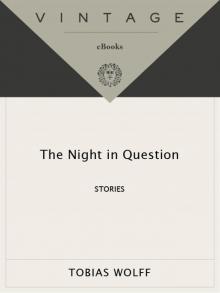 The Night in Question: Stories
The Night in Question: Stories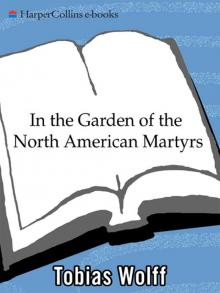 In the Garden of the North American Martyrs
In the Garden of the North American Martyrs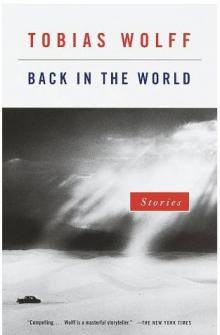 Back in the World: Stories
Back in the World: Stories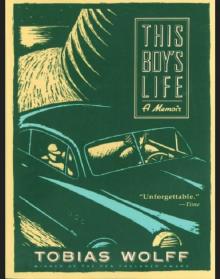 This Boy's Life
This Boy's Life Old School
Old School In Pharaoh's Army: Memories of the Lost War
In Pharaoh's Army: Memories of the Lost War Our Story Begins: New and Selected Stories
Our Story Begins: New and Selected Stories The Barracks Thief
The Barracks Thief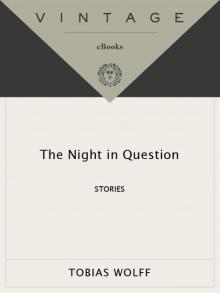 The Night In Question
The Night In Question In Pharaoh's Army
In Pharaoh's Army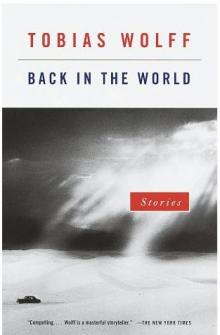 Back in the World
Back in the World